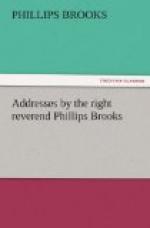But then we come to the beginning of all trouble. Abraham Lincoln was the type-man of the country, but not of the whole country. This character which we have been trying to describe was the character of an American under the discipline of freedom. There was another American character which had been developed under the influence of slavery. There was no one American character embracing the land. There were two characters, with impulses of irrepressible and deadly conflict. This citizen whom we have been honoring and praising represented one. The whole great scheme with which he was ultimately brought in conflict, and which has finally killed him, represented the other. Beside this nature, true and fresh and new, there was another nature, false and effete and old. The one nature found itself in a new world, and set itself to discover the new ways for the new duties that were given it. The other nature, full of the false pride of blood, set itself to reproduce in a new world the institutions and the spirit of the old, to build anew the structure of the feudalism which had been corrupt in its own day, and which had been left far behind by the advancing conscience and needs of the progressing race. The one nature magnified labor, the other nature depreciated and despised it. The one honored the laborer, and the other scorned him. The one was simple and direct; the other, complex, full of sophistries and self-excuses. The one was free to look all that claimed to be truth in the face, and separate the error from the truth that might be in it; the other did not dare to investigate, because its own established prides and systems were dearer to it than the truth itself, and so even truth went about in it doing the work of error. The one was ready to state broad principles, of the brotherhood of man, the universal fatherhood and justice of God, however imperfectly it might realize them in practice; the other denied even the principles, and so dug deep and laid below its special sins the broad foundation of a consistent, acknowledged sinfulness. In a word, one nature was full of the influences of Freedom, the other nature was full of the influences of Slavery.




